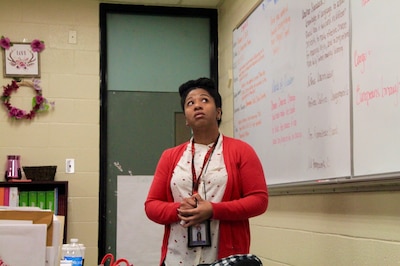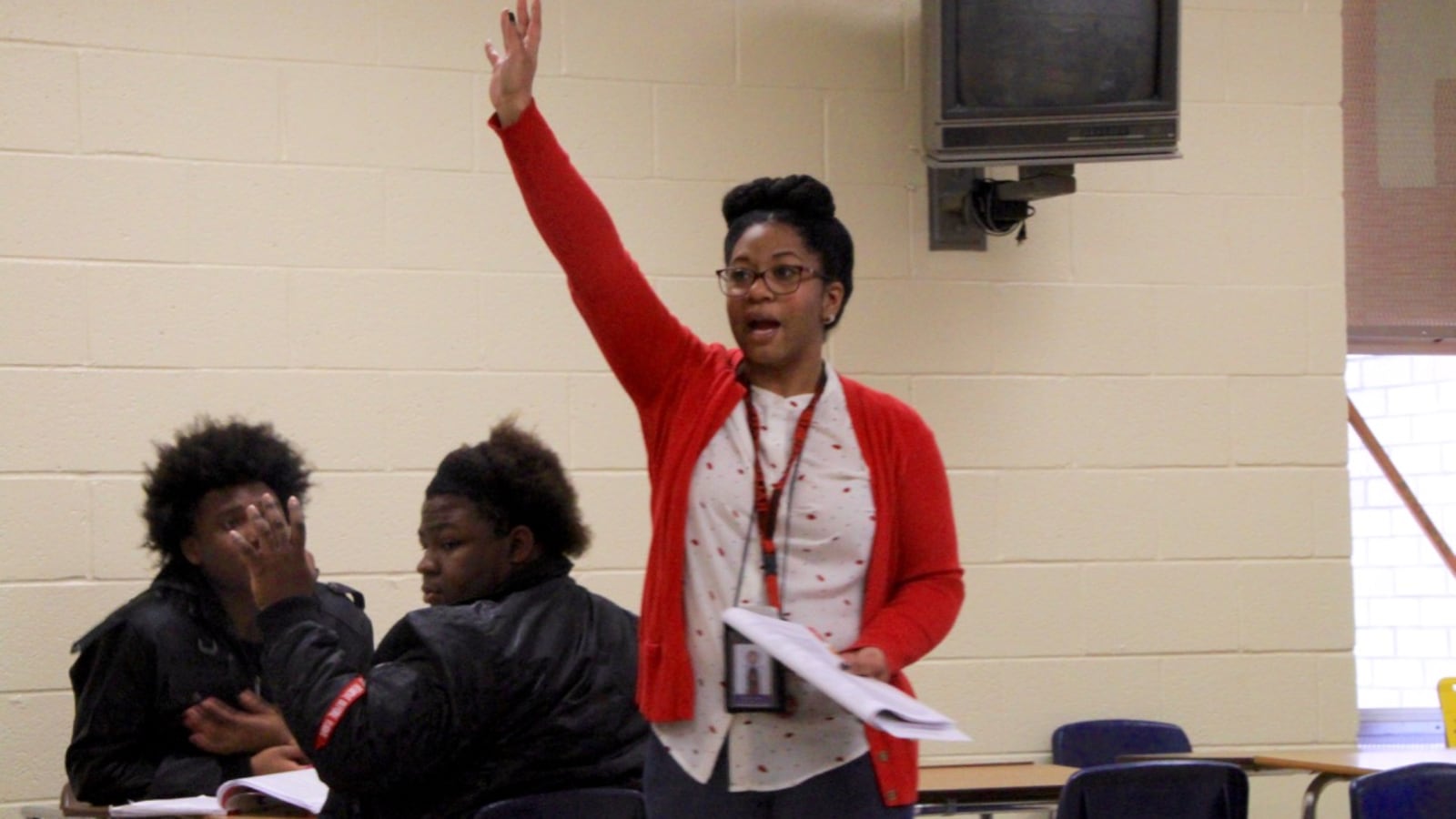How do teachers captivate their students? Here, in a feature we call How I Teach, we ask great educators how they approach their jobs. You can see other pieces in this series here.
When a week of snow days brought Candous Brown’s 12th-grade English class to a wintry halt, her students convinced her to take her lesson live on Facebook.
So wearing pajamas and with occasional photobombs by her 10-year-old son, Brown sat down at her laptop and convened an impromptu class with about 40 students from Raleigh-Egypt High School in Memphis. Some participants were actually previous students who decided to drop in.
“I’m so proud of y’all for actually wanting to do this,” she said at the outset, complimenting her students for their resourcefulness, ingenuity, and good use of technology.
The 33-year-old teacher has a knack for engaging her students where they are. That means frequently tapping into their love of music to grow their passion for literature.
“Why wouldn’t we focus on that?” she asks rhetorically.
During Black History Month, for instance, Brown pairs excerpts of Martin Luther King Jr.’s 1964 book “Why We Can’t Wait” with freedom songs from the documentary “Soundtrack for a Revolution.”
“I want them to know how music was utilized during the civil rights movement,” she said. “ In many instances, it was the thing that kept people motivated and unified.”
Chalkbeat spoke recently with Brown about teaching on Facebook Live and how she builds relationships with her students every day. (Her answers have been lightly edited for clarity.).
Why did you become a teacher?
I have always enjoyed literature and reading so it fit that I would be an English teacher. As a student, my teachers would use me as a peer tutor. I assisted classmates with their assignments and they would tell me I’d make a great teacher. Of course, I would reject the idea; but looking back on it, they were leading me in the right direction.
What is one of your favorite lessons to teach? How did you come up with the idea?
I love teaching anything Shakespeare. But more recently, my favorite lesson has been to teach “The Hero’s Journey.” We were reading Beowulf and I wanted the students to trace Beowulf’s journey into the hero that we know him to be in today’s culture. When I first start the unit, I have them think of heros within their own lives. Or times when they felt like they were the hero in a situation. I want them to be able to connect this hero’s journey to themselves. We read the text, participated in class discussion, did an analytical comparison of the movie and the text. The students loved it.
Recently, you received national attention for holding class via Facebook Live during a snow day. Why was it important to make instructional time happen during that long break? How do you instill excitement for learning in your students?
That was actually my very first time going live. I was so nervous. I didn’t want to say something foolish and have the entire virtual world see my flub. I got up that morning, planned for some anticipated misconceptions, and went for it.
My students were the ones who set everything up. They asked if I’d be willing to do the lesson and, of course, I couldn’t say no when they were willing to do the work. I told them about my apprehensions and then one student used a phrase that I tell them when they are afraid to try something new: “First time for everything.” At that moment, I knew I had to do it. It was important to make it happen because they wanted it to happen. I always tell them that they cannot wait to be within the confines of a school to learn.
It pleased my soul that they were still attempting to do the work without me and that they trusted me enough to reach out. I think when they see me get excited or passionate about certain topics, it resonates with them.
How do you respond when a student doesn’t understand your lesson?
Students tend to shut down when they don’t understand a lesson. Then, they state the infamous sentence: “I don’t get it.” I force them to think about the lesson and target the source of confusion. They have to be able to explain the problem to me before I help them. More often than not, their own explanation of the misconception helps them figure out the issue on their own. Also, they know that I am a last resort. They will ask a peer or neighbor before they ask me because they know I will make them explain everything they know before I will help. It forces them to explore their own understanding of the concept.
How do you get your class’s attention if students are talking or off task?
I usually don’t have to say or do much. My facial expressions do the talking for me. Once the kids see my face, they tell each other to get it together before I start fussing. Apparently, the last thing they want to hear from me is fussing.

How do you get to know your students and build relationships with them? What questions do you ask or what actions do you take?
At the beginning of the school term, my students complete an “Interest Survey.” I participate with them and allow them to ask me questions. I figure if I’m asking them questions about their lives outside of the classroom, they should be allowed to ask the same of me, within reason. When the surveys are done, I file them. No one will see their answers but me. When appropriate, I incorporate things I learn about them into the lessons to make them more relatable. In that way, they know that I am paying attention and it opens the floor to them so that they know I am trustworthy and truly have their best interest at heart. I never demean them for the things they reveal and I don’t shy away from tough conversations. My door stays open to them unless I’m grading or planning.
What’s the best advice you ever received as a teacher?
To remember why I’m in the classroom. Sometimes, the classroom can be daunting and overwhelming. I have my students, I’m the single mother of a 10-year-old son and, on top of that, I’m working toward a master’s degree. I could easily get discouraged. But if I remember why I’m there, it becomes manageable. I am there to serve my students. I am there to lead my students. Those two things are never lost upon me.



